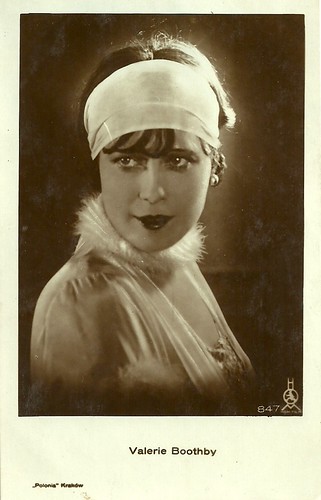
German postcard by Ross Verlag, no. 5272/1, 1930-1931. Photo: Lotte Jacobi.
Heydays of the silent cinema
Valerie - or Valery - Boothby was born as Wally Drucker in Hamburg, in what was then the German Empire, in 1904 (some sources say 1906). She was the oldest of three daughters and was of German-Jewish ancestry. Her father was the Hamburg theatre director and actor Ernst Drucker.
After she married an Englishman at the age of 16, she started to use the name Valerie Boothby. At the beginning of her career, she also used the pseudonym Vala de Lys. She entered the film business in 1925 during the heyday of the German silent cinema.
Her film debut was Der krasse Fuchs/The Clever Fox (Conrad Wiene, 1925). In the next years, she made many other silent films and her popularity increased quickly.
Among her films were Die Frau mit dem Weltrekord/The Woman with the World Record (Erich Waschneck, 1927), Das letzte Souper/Theatre (Mario Bonnard, 1928) starring Marcella Albani, and Angst - Die schwache Stunde einer Frau/Fear (Hans Steinhoff, 1928) in which she co-starred with Gustav Fröhlich and Elga Brink.
Valerie Boothby embodied popular types at the time as the flapper or the femme fatale who draws men to their doom with her feminine charms. Around 1928, her first marriage ended.

Austrian postcard by Iris-Verlag, no. 5684. Photo: Verleih Engel & Walter / Defina / Defu.
Portrait painter and author
From 1929 on, Valerie Boothby played on the Berlin stages under Victor Barnowsky and Fritz Rotter. She continued to appear in such silent films as Der Monte Christo von Prag/The Monte Christo of Prague (Hans Otto, 1929) with Walter Rilla, Frauen am Abgrund/Women on the Edge (Georg Jacoby, 1929) opposite Gustav Diessl and Mädchen am Kreuz/Girls on a Cross (Jacob & Luise Fleck, 1929).
During the early sound period, Boothby made her last films, including In einer kleinen Konditorei/In a Little Confectionery (Robert Wohlmuth, 1930) with French star Jaque Catelain, Er oder ich/He or I (Harry Piel, 1930), and Der Herr Finanzdirektor/Mr. Finance Director (Fritz Friedmann-Frederich, 1931) featuring Max Adalbert.
Her last film was So lang' noch ein Walzer vom Strauß erklingt (Conrad Wiene, 1931) starring Gustav Fröhlich as Johan Strauss Jr. Then her film career halted. Why is unclear. After the takeover by the Nazis in 1933, she emigrated to France. There she made headlines in the middle of the same year with a suicide attempt.
At the end of 1933, a newspaper announced that she planned to marry "dollar millionaire" Richard Armstrong, Woolworth's representative in France, and travelled with her mother Marie Drucker to New York to present him to her. Valerie Boothby subsequently lived for many years in Egypt. There she made a name as a portrait painter. In addition to portraits of personalities from Egyptian society. she also painted the "sea devil" Count Luckner, Albert Schweitzer and Theodor Heuss.
She married a noble Italian lawyer and her name was then Contessa Valerie Boothby-Colonna. She was the author of such children's books as 'Knurr und seine Bande oder Hunde erobern eine Stadt' (Knurr and His Dog Gang Conquer a City, 1954) and 'Der Katzenkapitän' (The Captain of the Cats, 1959). In 1970 she returned to her hometown of Hamburg and spent her last years there as Valerie Boothby-Colonna. In 1982, Valerie Boothby died at the age of 75 in Hamburg.

Polish postcard by Polonia, Krakow, no. 847. Photo: Hom Film. Postcard for one of the two Hom productions Boothby played in, either Der Mann, der nicht liebt (Guido Brignone, 1929), starring Gustav Diessl, or Vererbte Triebe (Gustav von Ucicky, 1929), starring Fritz Alberti.
Sources: Thomas Staedeli (Cyranos), Wikipedia (German), and IMDb.
This post was last updated on 8 July 2023.
No comments:
Post a Comment